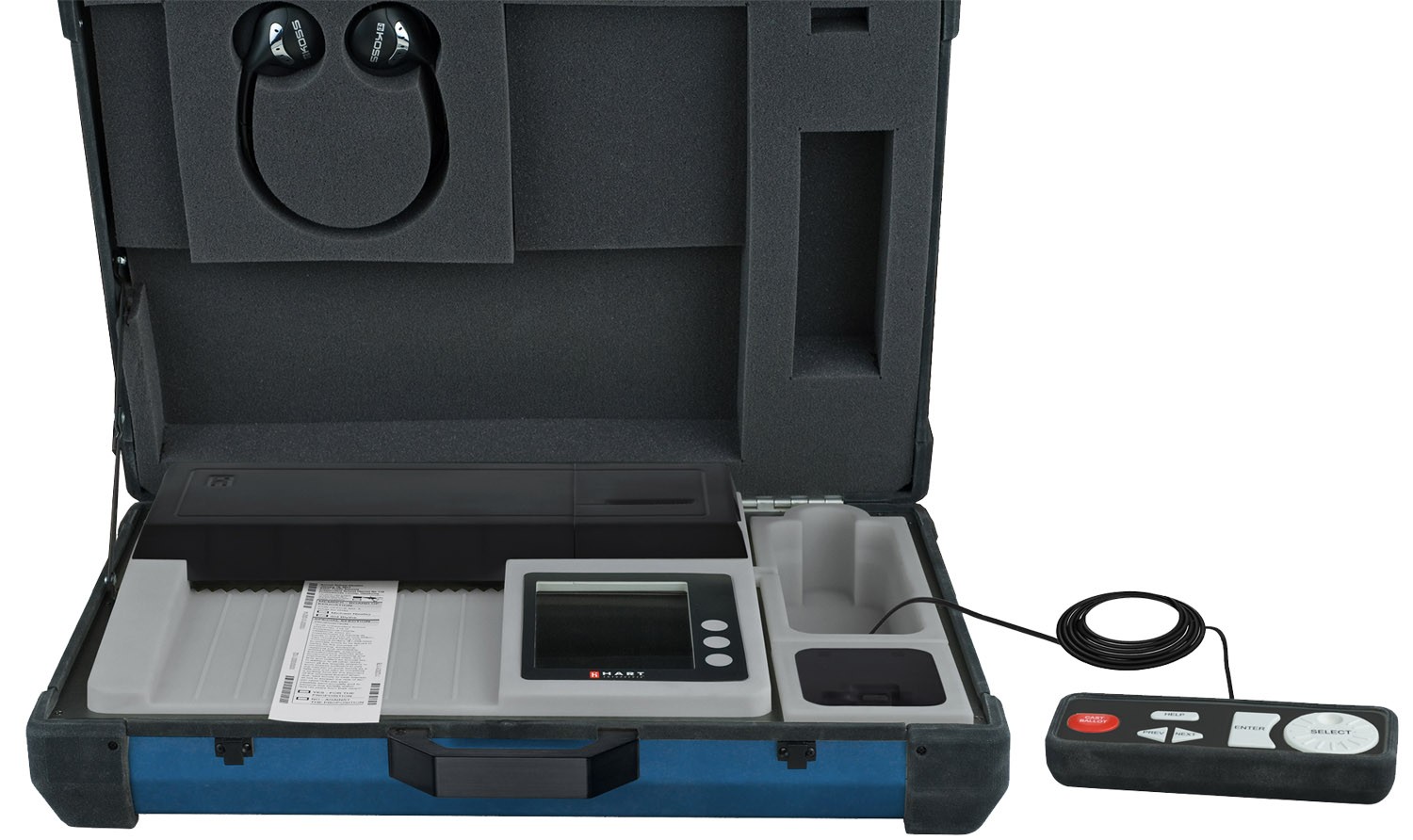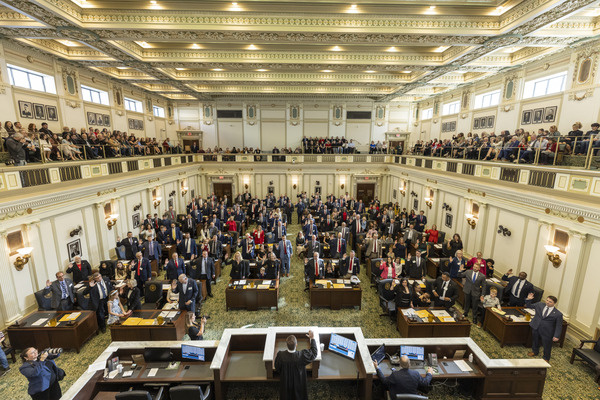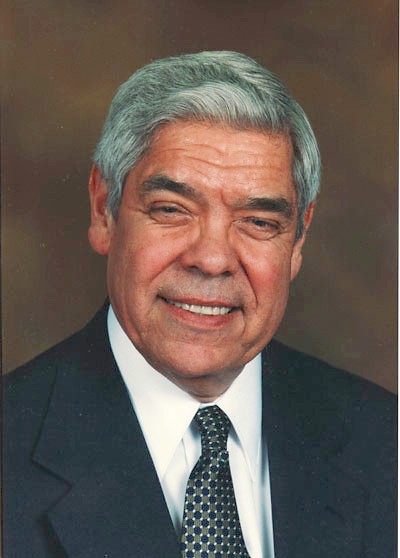Pictured: The White House
Results from Oklahoma Statewide General Election
PRESIDENT OF THE UNITED STATES
Oklahoma voters found five presidential candidates on the ballot in November. The choices included the nominees of the three political parties that are recognized by the state (Republican, Democratic, and Libertarian), plus two candidates running as independents. Former President Donald J. Trump won all 77 counties in Oklahoma. No Democrat has carried Oklahoma in the presidential race since 1964.
Former President Donald J. Trump, the Republican Party nominee, retook the office he lost in 2020. Trump was first elected to the presidency in 2016, but was denied a second term in 2020. Trump is not the first President to return to the White House. Democrat Grover Cleveland is the only other president to serve non-consecutive terms, from 1885 to 1889 and from 1893 to 1897. Donald Trump and his vice-presidential nominee, U.S. Senator J.D. Vance of Ohio, received 1,036,213 votes (66.16 percent) in Oklahoma.
Vice President Kamala Harris was the Democratic Party nominee for president. Since 2021 she served with President Joe Biden who abandoned his bid for a second term. Harris was then named as the presidential nominee. She was the first female, African American, and Asian American vice president, making her the highest-ranking female official in U.S. history. She served in the United States Senate from 2017 to 2021 as the junior senator for California. She was previously the attorney general of California. Tim Walz, governor of Minnesota, was her running mate. Harris and Walz received 499,599 (31.90 %).
Chase Oliver was the Libertarian Party nominee. He unsuccessfully ran in a 2020 congressional district Special Election in Georgia and also for the 2022 Georgia Special Election for the United States Senate. In the 2022 election, he was credited or blamed for forcing the runoff between Democratic incumbent Raphael Warnock and Republican challenger Herschel Walker. He is a libertarian political activist, as well as a sales account executive. Economics professor Mike ter Maat was the nominee for vice president. He also ran for the presidential nomination which he lost to Oliver. The Libertarian candidates finished in fourth place with 9,198 votes (0.59%).
Robert F. Kennedy, Jr. was on the ballot as an independent candidate and finished in third place. He is a nephew of President John F. Kennedy and son of Attorney General Robert F. Kennedy. He initially challenged President Biden for the Democratic nomination, but launched an independent run after being pushed out. While the best-selling author and environmental lawyer suspended his campaign and endorsed Donald Trump, Kennedy remained on the ballot in states like Oklahoma where his presence would not endanger the election of Trump. Kennedy said there were several considerations that led him to pull out of the race. First was the censorship, media blockade, and legal warfare by the Democratic Party that kept his message from reaching the electorate. Second was the fact that many of his core issues are shared by Donald Trump. Kennedy’s vice-presidential candidate is Nicole Shanahan of California. Kennedy and his running mate received 16,020 votes (1.02%). Following the election, Trump named Kennedy as his choice to serve as Cabinet Secretary for Health and Human Services.
Chris Garrity of New Hampshire ran as an independent. He did not have a campaign staff and did not accept donations. He ran “to rid our government of the rot of party politics.” Oklahoma is the only state in which he was on the ballot, but ran as a write-in candidate in states where it is allowed. Cody Larry Ballard of Maryland was his running mate. The pair finished in last place with 5,143 votes (0.33%).
OKLAHOMA CORPORATION COMMISSION
The Oklahoma Corporation Commission (OCC) regulates oil and gas drilling, electric and gas utilities, trucking, pipelines, and telecommunications in Oklahoma. There are three Corporation Commission seats with six-year staggered terms. So, every two years one of the seats is up for reelection. The seat held by Republican Bob Anthony was up for election in 2024.
Anthony is the longest serving member of the commission, completing his sixth and final term. He could not run for reelection in 2024 due to Term Limits. While the term limits law for state offices only allows two terms for members of the commission, the law did not apply to the seat until 2012 when Anthony was elected to his fifth term. He was elected to his final term in 2018. The other two commissioners are Republicans Todd Hiett and Kim David, and their seats will not be up for election until 2026 and 2028 respectively.
During his 36-year tenure on the Corporation Commission, Anthony has often been the lone voice speaking up for the utility consumers in Oklahoma. He was the only vote against the plan that passed the 2021 winter storm costs onto Oklahoma electric and natural gas customers.
Three Republicans, a Democrat, and a Libertarian filed for the open seat. The nominees of the three officially recognized political parties in the state were on the November ballot.
J. Brian Bingman, 70, of Sapulpa secured the Republican Party nomination in the June 18 GOP Primary election. He began his career as a petroleum landman for Continental Oil Company (now Conoco-Phillips) soon after graduating from college. He was later vice president of land and operations for Uplands Resources. He is a former mayor of Sapulpa, was a member of the Oklahoma House, and then served in the Oklahoma Senate. He ended his legislative career serving as the Senate Pro-Tempore for six years before being Term-Limited from office in 2016. He was one of the more moderate Republicans in the Legislature with a cumulative average of 59% on the Oklahoma Conservative Index published by the Oklahoma Constitution.
Bingman unsuccessfully challenged Anthony for the Republican nomination in 2018. Anthony finished in first place in the GOP Primary that year with 47% of the vote and went on to win the runoff with nearly 54% of the vote over Bingman. In 2020 Bingman was appointed to serve as Secretary of State and Secretary of Native American Affairs by Gov. Kevin Stitt. He resigned in 2023 in anticipation of his run for the Corporation Commission seat. Bingman finished first in the November election with 979,802 votes (63.67%).
Harold Spradling, 89, of Oklahoma City made his fourth race for a spot on the Corporation Commission, this time as a Democrat. Spradling had previously run as a Republican. He finished in last place in the 2022 the Republican primary. He also ran in 2018, and 2020. The retired businessman and social worker was also an unsuccessful candidate for the Oklahoma House in 1994. This time Spradling received 444,736 votes (28.90%).
Libertarian Chad Williams, 43, of Choctaw has served as chairman of the Libertarian Party of Oklahoma and served on the Choctaw City Council from 2019 to 2023. He is president of Automated Home Solutions, a home inspection and residential technology concierge service. He received 114,257 votes (7.43%).
STATE QUESTIONS
Oklahoma voters had two State Questions on the General Election ballot on November 5. Both measures were referrals by the Oklahoma Legislature from the 2024 legislative session.
Oklahoman’s have voted on over 400 State Questions since statehood. Proposals are often placed on the ballot through the initiative petition process by collecting the signatures of a sufficient number of voters. But State Questions can also be initiated by the Legislature with passage of a resolution in both chambers, and does not require approval of the governor. The Oklahoma Legislature submitted two legislative referendums in 2024.
State Question 833 - Public Infrastructure Districts
Senate Joint Resolution 16, by Sen. John Haste (R-Broken Arrow) and Rep. Terry O’Donnell (R-Catoosa), would amend the Oklahoma Constitution to let municipalities create Public Infrastructure Districts (PID). Cities would be able to use a PID to finance infrastructure improvements such as roads, sidewalks, parks, water, and sewer to serve developments. The PID would be able to issue bonds to finance the infrastructure in the area and repay the bonds through an up to 10 mill property tax assessment on properties in the PID.
The proposal was rejected by Oklahoma voters in November with 898,526 voters saying NO (61.61%).
State Question 834 - Qualifications of Electors
Senate Joint Resolution 23 by Sen. Micheal Bergstrom (R-Adair) and Speaker of the House Charles McCall (R-Atoka) aims to clarify and secure the voting rights of United States citizens in Oklahoma. The measure amends the state constitution to clarifying that only citizens of the United States are qualified to vote in Oklahoma. The amended language prevents any confusion or disputes regarding voter eligibility in future elections. The previous language could be interpreted by Oklahoma’s undependable high court to allow any Oklahoma resident to vote regardless of citizenship.
Oklahoma voters overwhelmingly approved the State Question 834 by 1,207,520 votes (80.73%).









Latest Commentary
Sunday 2nd of February 2025
Sunday 2nd of February 2025
Sunday 2nd of February 2025
Sunday 2nd of February 2025
Sunday 2nd of February 2025
Sunday 2nd of February 2025
Sunday 2nd of February 2025
Sunday 2nd of February 2025
Sunday 2nd of February 2025
Sunday 2nd of February 2025
Sunday 2nd of February 2025
Sunday 2nd of February 2025